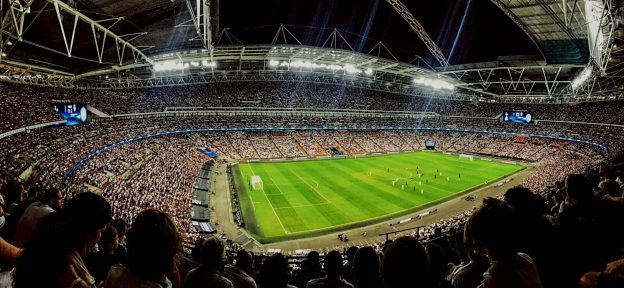David Sosa – In the last few years, Saudi Arabia has proven that they have the ability to influence some of the most popular professional sports in the world. Specifically, Saudi Arabia has utilized its Public Investment Fund (“PIF”), which harbors over $950 billion in assets, to acquire considerable interests in major sports organizations, sign notable professional athletes to Saudi Arabian sports teams, and even start a war with one of America’s oldest sports organizations—the PGA tour.
In 2021, Saudi Arabia’s PIF invested over £550 million in to McLaren Group, which includes McLaren’s Formula 1 Racing team. That same year, Saudi Arabia’s PIF acquired an 80% ownership interest in Newcastle United, a prominent English soccer club. In 2022, Lionel Messi, one of the best soccer players in the world, became a Saudi Arabian ambassador. In 2023, Saudi Arabia’s PIF not only explored a $20 billion bid for Formula 1, but also successfully signed world renowned superstar Cristiano Ronaldo to the PIF-funded Al Nassr professional soccer club. Shortly after, Al Hilal, another PIF-funded Saudi soccer team, offered European soccer star Kylian Mbappe a $1.1 billion deal to play for the team. Shortly after Mbappe rejected the offer, Al Hilal signed Brazilian soccer star Neymar to a deal worth $100 million a year. In 2024, the Association of Tennis Professionals (“ATP”) announced a five-year sponsorship with Saudi Arabia’s PIF.
But Saudi Arabia’s efforts to force their way into professional sports do not stop in Europe. Last year, Saudi Arabia strongarmed their way into professional golf after leveraging the PGA Tour into agreeing to merge with LIV Golf. Funded by Saudi Arabia’s PIF, LIV Golf emerged in the U.S. in 2022 and quickly began poaching PGA Tour members by offering them hundreds of millions of dollars in guaranteed compensation, which amounted to considerably more than their overall PGA Tour career earnings. At the same time, LIV Golf filed an antitrust suit against the PGA Tour alleging that the PGA Tour used monopoly power to squash competition. After a lengthy legal battle, and almost $50 million in legal fees, Al-Rumayyan, the governor of Saudi Arabia’s PIF, agreed to drop the Antitrust suit after the PGA Tour and LIV Golf informally agreed to a merger. The initial deadline for the merger was set for December 31, 2023, but this deadline was recently extended to sometime in 2024. Regardless of whether the merger is completed or not, or even whether it is legal or not, Saudi Arabia’s ability to bully their way into Europe’s and America’s most prominent professional sports creates some alarming implications for other American professional sports.
With almost a trillion dollars in assets, and a vision “to be a global investment powerhouse,” Saudi Arabia’s PIF has exponential financial leverage to weaponize against American sports leagues such as the National Basketball Association (“NBA”) and National Football League (“NFL”). While the PGA Tour is worth roughly $1.5 billion, some of Europe’s richest soccer clubs are worth anywhere from $4 billion to $6 billion. Yet, these clubs were still unable to compete with the Saudis’ PIF-funded lucrative deals. Some of the highest-paid players in the NBA and the NFL make roughly 5% of what Saudi Arabia offered Kylian Mbappe. This begs the question: what would these football and basketball superstars do if they were offered deals similar Mbappe’s? Additionally, the most valuable NBA and NFL franchises are worth roughly $7 billion to $9 billion. Barring legal issues and entry hurdles, Saudi Arabia certainly has enough capital in the PIF to start a professional American sports team. Even taking these professional sports leagues as a whole, the NBA and NFL are worth $120 billion and $163 billion, respectively. What’s stopping Saudi Arabia from using the PIF’s $925 billion in assets to start an American basketball or football league and offer NBA or NFL superstars deals they can’t resist?
Not only does Saudi Arabia have financial leverage, but it also has legal leverage that can be used against American professional sports. Without the capital to compete with LIV Golf, the PGA Tour had to use alternative means of defending itself: permanently banning any player that joined LIV Golf from competing in PGA Tour events. But this quickly led to the antitrust suit against the PGA Tour that inevitably forced the Tour to agree to merge with LIV Golf. With LIV Golf using the PGA Tour’s market control as a weapon, what does this mean for other American professional sports? The NBA and NFL certainly have considerable market control in their respective industries. In fact, the Department of Justice investigated the NBA less than a year ago for a potential antitrust violation. The NBA allegedly prevented sponsors from getting involved in a startup 3 v. 3 basketball league and discouraged NBA team owners from investing in the new league. To top it all off, the startup league accused the NBA of putting rules in place that prevented players from playing in the new league, similar to the PGA Tour’s defensive tactics.
In 2017, the Supreme Court held that the NFL is not a single entity, which would give the NFL immunity from antitrust liability. What’s stopping Saudi Arabia from using the NBA and NFL’s market control as leverage to force their way into American football or basketball? If Saudi Arabia started a professional sports league in America, any defensive tactics employed by an American professional sports league would certainly be the subject of an antitrust suit. Without the financial or administrative means to defend itself against Saudi Arabian intervention, U.S. professional sports leagues may be helpless against Saudi Arabia’s PIF, a financial “powerhouse,” which has already been weaponized throughout European sports and American golf. Consequently, the future of U.S. professional sports is as hazy as it’s ever been as fans, athletes, owners, and investors in the U.S. witness Saudi Arabia’s hostile takeover of their beloved sport.


